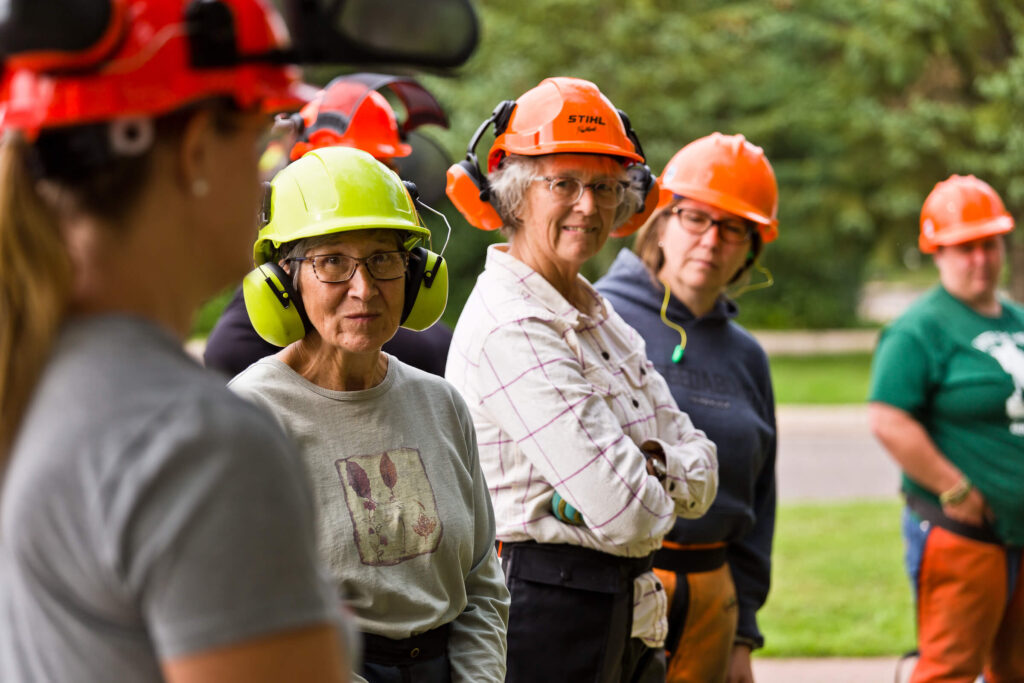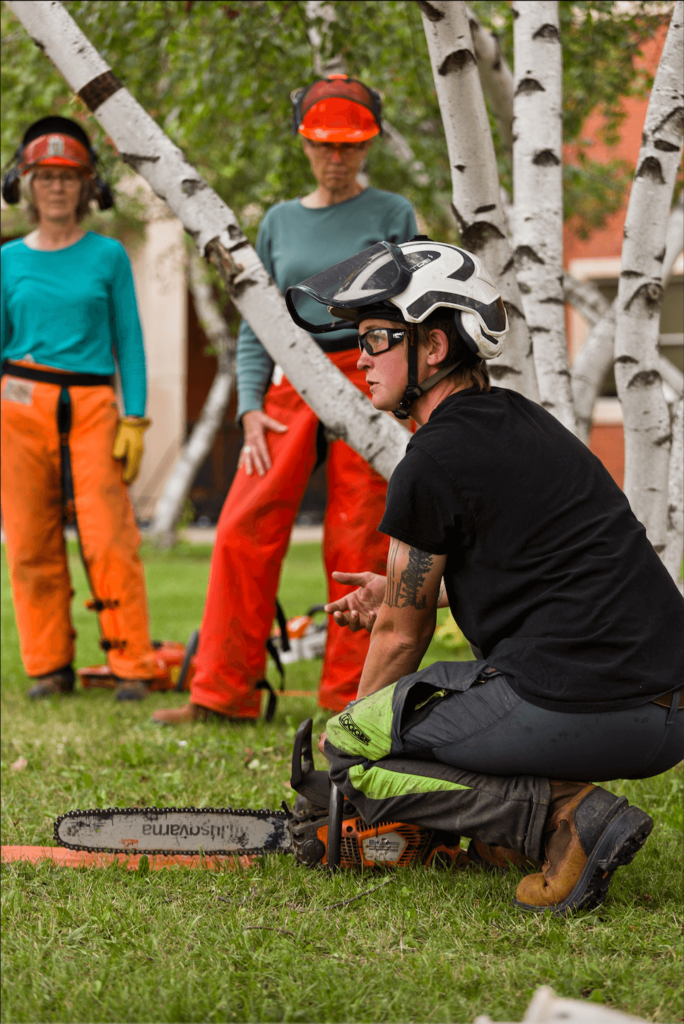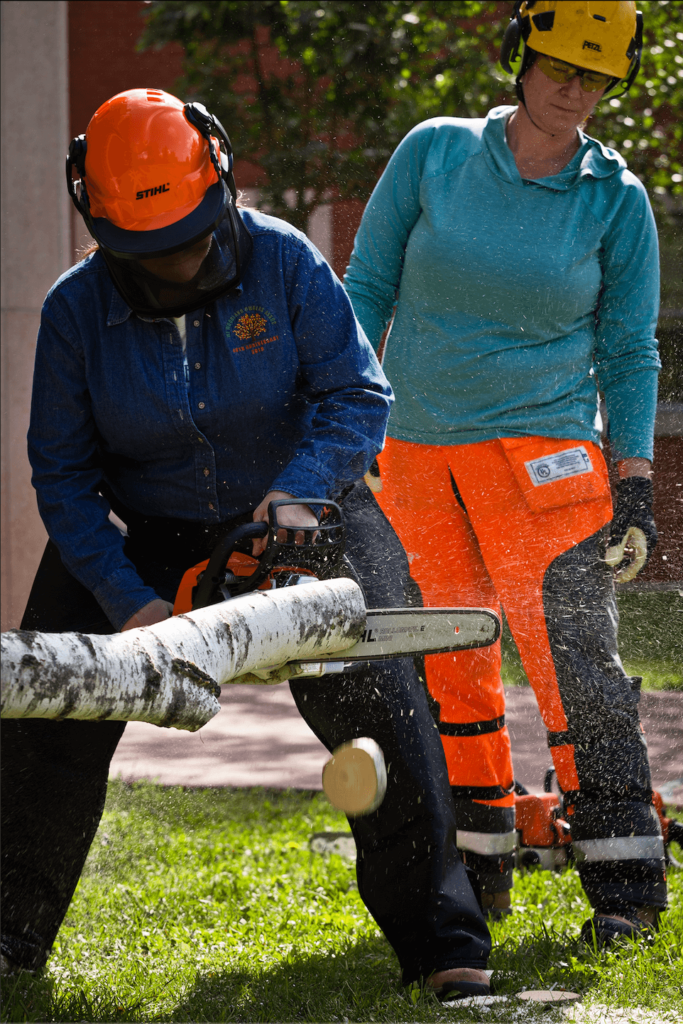“I had recently bought some land, and shortly after, a huge straight-line wind storm came through and brought down a bunch of really big trees. We had to get help and that’s when I knew I needed to learn how to use a chainsaw.”
Last year, Brooke Derrickson participated in University of Wisconsin Extension Forestry’s Women’s Chainsaw Safety Training Workshop. The workshop, tailored for women woodland owners, trains women on how to operate chainsaws safely and effectively, while also offering woodland knowledge and the opportunity to meet a community of like-minded women.
Historically, Derrickson explains, women have experienced barriers to learning and practicing skills in natural resources like chainsaw operation. Yet, there are a growing number of women woodland owners in Wisconsin and beyond — making these workshops especially important in supporting and empowering them.
For many women, this workshop is their first experience even holding a chainsaw. Extension Forestry Educator and workshop organizer Olivia Kovacs explains that many women say their partners have known how to use chainsaws since they were kids, but the women themselves never got that exposure.

The women’s chainsaw workshop is a two-day weekend event that has been held in several different regions of northern Wisconsin since its creation. Kovacs says participation is always high for these events.
On the first day, the women are introduced to each other and the certified instructors, discuss their specific land-based interests, and begin learning the basics of chainsaw operation. The second day is when things get exciting: the participants get their hands on the chainsaws.
Operating a chainsaw is serious — and it can be scary too. Luckily, the women’s workshop provides a space for women to learn at their own pace and feel safe asking questions, making mistakes, and expressing their fears.

“Having a space that’s instructed by women and for women only…encourages women that would otherwise not show up to feel more comfortable,” Derrickson says.
By the time the workshop is over, many of their fears have been allayed. According to Kovacs, the participants learn everything from the proper stance and body mechanics, to how and where to apply chainsaws on the landscape.
Operating a chainsaw as a woman can require a different technique than operating one as a man due to differing body types and lifting capacities. So, the workshop teaches women how to harness their bodies’ strengths to operate the chainsaw effectively and safely — not something that’s taught in many other chainsaw classes.
Habitat Restoration Specialist and business owner Cheryl Jirik is an instructor for these courses, and emphasizes that safety is the most important thing. Some of this safety training involves personal protective equipment, like appropriate chaps, clothing, and even hairstyles to ensure nothing gets caught in the saw.
“You don’t get in your car and start driving until you’ve been through the proper training,” Jirik says. “So, to develop those safe practices right off the bat, I think is very important for our confidence. It also helps us become more efficient as we’re working.”
Once the participants have more confidence in holding the chainsaw, the instructors place them into smaller groups to practice different cutting techniques for varying sizes of trees. Extension Natural Resource Educator Lauren Larsen says this is an important next step in the workshop because it provides women with information on how to apply their new skills to their own land.

“In Wisconsin and nationally, women are now becoming the primary decision maker on their land,” Kovacs says.
Women tend to outlive their partners, and women may also be purchasing more land or inheriting land from their families. With this growing number of women woodland owners, Extension is hoping to support them as important decision makers for the land by offering workshops like this, Kovacs contends.
The instructors get just as much out of the workshops as the participants. Jirik notes she enjoys seeing the participants grow throughout the workshop, moving from a place of apprehension to a place of confidence.
“It’s the expressions that I see on their faces, their confidence, their sense of empowerment, and just pure joy that they’ve accomplished this thing that to them, two days earlier, was insurmountable — it’s addicting,” Jirik says.
Jirik, and her co-instructors, always approach their teaching with kindness and attention. Before the women use the chainsaw, Jirik walks them carefully through the maneuvers and checks in with each woman to make sure they are feeling okay before running the machine.
It’s normal to feel stressed before operating a chainsaw—it’s a dangerous machine, Jirik claims. So, if someone is feeling anxious, the instructors always let them take a break and try again later, Jirik explains.
After the workshop, many of the women stay in touch on Facebook groups, where they foster a community of support and shared interest in maintaining their land, Kovacs explains. It also helps the women stay updated on upcoming Extension workshops.
“I just would encourage you to participate because knowledge is power, and as landowners and land managers—whether [it be] men or women—to be able to have the confidence to do this on our own is really awesome,” Jirik says.




